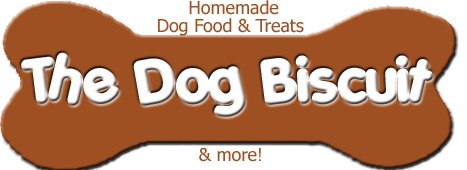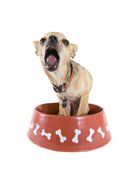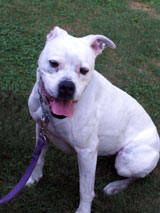 |
 | 
|
Dogs and ChocolateChocolates are Toxic Foods for Dogs!Dogs and chocolate do not mix well. A canine eating chocolate results in dog food poisoning as chocolates are toxic foods for dogs. Hearing, 'my dog ate chocolate', means you need immediate and quick action to alleviate dog sickness. Most everyone who owns a canine has at least heard that chocolate is poisonous for dogs. Many people wonder if it is really true and how much chocolate is too much. There are also questions as to what types of chocolates are harmful and what to do if their dogs gets into chocolate by accident. These are important questions that need to be answered, and understood. Dogs and Chocolate: What's the Harm?The harmful ingredient in chocolate for dogs is primarily theobromine, which is a naturally occurring ingredient in chocolate. The cocoa bean has a very high concentration of this ingredient and caffeine. Caffeine can be toxic as well. The main reason why these substances are toxic to dogs is because they stay in a dog's bloodstream a very long time and, as a result, over-stimulate the central nervous system. This adversely affects the heart and kidneys causing them to shut down. A lethal dose of both caffeine and theobromine is between 100 mg and 200 mg per kg (2.2 lbs) of the dog's body weight. The amount of these ingredients varies according to the type of chocolate. Generally speaking, because of the pureness, chocolate used for cooking is more lethal than chocolate bars. Dry cocoa power contains 808 mg of theobromine and caffeine per ounce whereas milk chocolate only contains 64 mg. Dark chocolate has more than either white chocolate or milk chocolate. Dog Sickness and Chocolate: Your Dog's Size MattersHow much chocolate will be harmful to your pet will depend both on the type of chocolate he has eaten, and how much he weighs. The smaller the canine is, the less he has to eat to be made sick. Larger dogs can eat more chocolate without serious ill effects. For example, dogs weighing 60 pounds can eat a teaspoon of chocolate with only mild or no ill effects, but dogs weighing 15 pounds can become sick by the same amount. A dog that has eaten chocolate will develop symptoms of toxicity within a couple of hours. They will become hyperactive and experience vomiting and diarrhea. Remember the harmful effects will continue to intensify because of the slow absorption process. As the dog's body absorbs more of the toxins his heart rate will increase and the pet will become more restless and hyperactive. The rapid heart rate will result in heart arrhythmia, muscle twitching, panting and excessive urination. If it is a lethal amount of chocolate, the canine will have seizures, fall into a coma and die. Toxic Foods for Dogs: Dog Food Poisoning and TreatmentSince the toxins are in the body for a long time, your best bet is to induce vomiting. If you catch your dog eating chocolate, try a small amount of hydrogen peroxide to make your pet vomit up the poisonous chocolate. A veterinarian should be consulted as soon as possible as they can prescribe other medications to assist your canine. Activated charcoal can be used to prevent the toxins from being absorbed by the body. The vet may also recommend an anticonvulsive medication, intravenous medications, oxygen therapy and fluids. If your dog eats chocolate (especially if it has ingested a significant amount of chocolate); call your vet. They will tell you that dogs and chocolate do not go together. Your veterinarian is your best line of defense and knows how to treat your pet for best results. Chocolate is lethal for dogs and should be kept out of their reach at all times. Always keep dogs and chocolate separate. After Treatment: Dogs and ChocolateOnce your dog sickness recovery is managed by your vet, and you, it is time to try to re-balance your dog's digestive health. We recommend a 100% herbal remedy called PetAlive Digestive Support which is developed to treat digestive system problems in pets. Its benefits include balancing and maintaining healthy digestive functioning; soothing gastric mucus membranes irritated by the toxic foods for dogs; and supporting absorption of nutrition. Digestive Support is a good digestive system tonic for your pet and contains carefully chosen herbs in therapeutic dosage to soothe and support the stomach lining, esophagus, and entire digestive tract of your canine. Share Your Story:Do you have a story to tell about your dog and chocolate? Or other toxic foods and dogs and how you handled the resulting dog sickness. We would all like to learn more about how to help our pets: what worked and what didn't. Thanks! Dog Health Info and the Relationship to Dog NutritionAccessing dog health info submitted from the experiences of other dog owners is important to all of us; we can learn from the good and bad stories. Return to top of Dogs and Chocolate Return to Dog Health Info Return to The Dog Biscuit Home Page | Related Articles
Dog Health Info This section contains articles about dog health info. Each of these articles are meant to give you information about your beloved pooch. Dog Health Dog health and nutrition go hand in hand. Choosing the right diet for your pet is very important. Bad Dog Breath Does your dog's bad breath signal more serious health issues? Canine Ear Infection: Can be Painful and Serious Is your pet shaking its head or scratching its ear? What are dog ear infection symptoms and treatments? Canine Health: How Diet Affects Oral Health Did you know that a very important matter in canine health is taking proper care of your dog's mouth. Just like with us humans, proper oral care for your pet results in good general health. Canine Kennel Cough is a Serious Dog Sickness Coughing, fever, lethargy are just some of the symptoms of dog kennel cough. Find out more about symptoms and treatments. Dogs and Chocolate Chocolate is poisonous for dogs. Learn what to do if your canine eats chocolate. Dog Bad Breath If your pooch has bad breath, don't ignore it. Bad breath, or halitosis, can be a signal of other health issues. Dog Bladder Infection Make sure you know what the symptoms are of this common dog illness; and how to treat it. Dog Dehydration Water is a very important part of your dog's daily diet; understand the consequences of dehydration. Dog Depression Depression in your canine is more common than you might think; and more serious. Dog Ear Infection Treatment Ear infections in dogs is quite common; prevention is the best remedy. Dog Losing Weight: Is this Good or Bad? If your pet is losing weight too fast, it can be a signal of a serious health issue. Check it out. Dog Weight Control: It's Important for Your Pet If your canine is gaining weight or is pudgy and out of shape, you need to improve its diet. Dog Seizure Dog seizures can be a signal of poisoning or other serious dog illnesses. Dog Skin Conditions What causes dog skin irritations? How can you make your canine's skin healthy? Overweight Dogs Overweight in an animal can cause (or be a symptom of) serious health issues. Provide your canine with a good diet. Probiotics for Dogs Probiotics are life supporting bacteria, they can help improve your dog's overall health. Sick Dog Symptoms Is your pooch sick? What are the symptoms, causes and treatment for illness in your pet? Toxic Foods for Dogs What foods are dangerous to your pet? How to identify symptoms of poisoning in dogs? Yeast Infection - Dog Can dogs get yeast infections? How to identify and treat? | |
     
Enjoy This Site?
Then why not use the button below, to add us to your favorite bookmarking service? | ||
|
| Home | About
| Contact | Sitemap
| What's New
|Privacy Policy |
This site is for informational purposes only. If you have an issue with your dog's health, please see your vet.
Website design by Webmidwife.com | ||
| | ||







